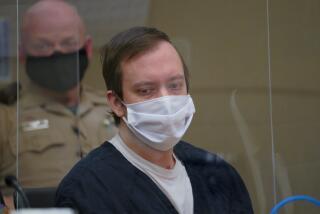DNA âfamilial matchâ ties DeSalvo to 1964 Boston Strangler case
Advanced DNA technology has led to a breakthrough in linking the longtime suspect in the 1960sâ Boston Strangler serial killings to the last victim, Boston authorities announced Thursday.
A âfamilial matchâ produced by nearly 50-year-old DNA evidence has tied Albert DeSalvo to the 1964 rape and killing of Mary Sullivan, Suffolk Dist. Atty. Daniel Conley said during a televised news conference Thursday morning.
A judge has granted a request to exhume DeSalvoâs body, which will take place this week, Conley said. The remains will be taken to the chief medical examinerâs office, he said, noting that it could be a matter of days before an exact DNA match is made.
The new evidence is the strongest yet to link DeSalvo -- and only DeSalvo -- to the case, authorities said. Conley said the âfamilial matchâ excludes 99.99% of suspects but is not enough to definitively close the case.
âThese samples are only involving Mary Sullivanâs case,â Massachusetts Atty. Gen. Martha Coakley said. âWe are aware of no other DNA evidence that has survived from any of the other 10 murders we have been looking at.â
Sullivan, 19, was found strangled in her Beacon Hill apartment Jan. 4, 1964.
She was the last of 11 Boston-area women between the ages of 19 and 85 who were brutally raped and killed between 1962 and 1964, a case that gripped the city and the nation.
DeSalvo confessed to being the Boston Strangler but never faced charges in the killings. He later retracted the confession.
He was found stabbed to death in his prison cell in 1973 while serving time for assaults on four other women in their suburban Boston homes in 1964.
ALSO:
Judgeâs unique sentence: Woman told to write about being a lady
âGreat Gypsyâ or âGreat Gatsbyâ? N.Y. school reading list gets an F
Lawyers to debate lesser charges in George Zimmerman murder trial
Twitter: @devckelly
More to Read
Sign up for Essential California
The most important California stories and recommendations in your inbox every morning.
You may occasionally receive promotional content from the Los Angeles Times.










